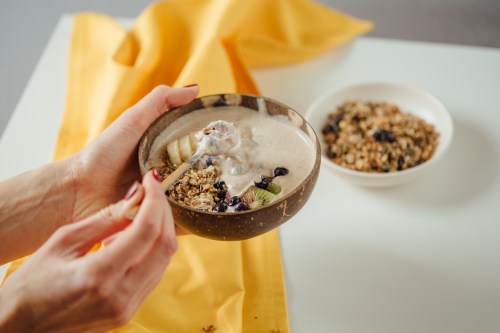TikTok Just Rolled Out a Surprising New Feature—and Doctors Are Totally Here for It
Even TikTok wants you to stop scrolling.

Who among us hasn’t found themselves cruising through TikTok at night, only to realize it’s *way* past your bedtime? Mindless scrolling is a known issue with social media, and TikTok has just come up with a solution to try to help combat it—at bedtime, at least.1
Experts in This Article
clinical psychologist, associate professor at NYU Langone, and co-host of the Mind In View podcast
neurologist, sleep specialist, and author of The Sleep Solution
Today, they're rolling out a brand new feature, and you may be surprised to hear that it's coming in the form of in-app guided meditation exercises. TikTok started testing these exercises with select teens earlier this year, and just rolled the feature out to everyone, the company announced. While the feature offers guided meditation, the end goal is to stop late-night scrolling and encourage teens (and adults alike) to go to bed.
Sure, it’s possible to get around the feature, but mental health and sleep specialists say it’s a step in the right direction. Here’s how it works, plus why some experts are already on board.
How does the feature work?
This new feature was designed for TikTok users under the age of 18 in mind. (Don't worry, if you're older than 18, you can still use it, too! More on this in a second.) If someone in the under-18 age group is on TikTok after 10 p.m., their "For You" feed will automatically be interrupted with TikTok’s new “wind down” feature.
This is a full-screen takeover that plays calming music, along with breathing exercises. If a teen decides they want to keep scrolling after that reminder, they’ll get a second full-screen prompt that’s harder to dismiss, according to TikTok.
TikTok first shared back in March that the company was testing the feature as a way to support parents in helping teens build “balanced” digital habits.
While this feature may have been designed to cater to teens, TikTok also notes that adults can turn their sleep hours on from their Screen Time settings page and use the meditation feature, too. And, according to the company, 98 percent of the teens who meditated with TikTok—during the initial testing phase earlier this year—decided to keep the feature switched on. And our sleep experts hope that adults leave the feature toggled on, too.
Why is late-night scrolling so bad for you?
Let's be real: We've all spent time scrolling on our phones before we go to sleep (sometimes even when we're supposed to already be asleep). But, there are a few reasons why scrolling late at night isn’t great for your mental or physical health. “It’s a bad habit to get into,” says W. Christopher Winter, MD, a neurologist and sleep medicine physician with Charlottesville Neurology and Sleep Medicine, and host of the Sleep Unplugged podcast. “It keeps people from sleeping.”
On the minor end, lack of sleep can make you feel groggy and unfocused the next day. But over time, built-up sleep deprivation can raise the risk of developing a slew of health conditions, like diabetes, obesity, and depression, per the National Heart, Lung, and Blood Institute (NHLBI).
Speaking of mental health, mindlessly scrolling can just give you a feeling that you’ve wasted your time, says Thea Gallagher, PsyD, a clinical assistant professor at NYU Langone Health and co-host of the Mind in View podcast. “You can feel like you don’t have a lot of control over the process,” she says. “Some social media can be fulfilling, but when you feel like you’re mindlessly doing something, it’s not a good feeling.”
Dr. Winter says the new TikTok feature is a great reminder that it’s time to wind down for sleep and can help people realize that it’s gotten late. “I like the idea that it forces people to make a decision,” he says. Dr. Winter notes that meditation as a whole is “awesome” for helping people relax at night.
This is all part of TikTok’s larger commitment to mental health
TikTok recently launched a Mental Health Education Fund, which includes donating $2.3 million in ad credits to 31 mental health organizations in 19 countries around the world. The fund was created in 2023 to help support organizations in creating uplifting mental health content. And so far, it has received $7.3 million in donations.
TikTok also has a screen time management feature called "Digital Wellbeing” that lets users set daily limits for how long they’re on the app. Every account for a person under the age of 18 automatically has a 60-minute daily screen time limit. However, adults over 18 years old can set up screen time limits within the app as well. (FYI, you can also set screen time limits across all your apps in your general phone settings, too.)
While anyone can technically just click out of this meditation feature and decide to continue scrolling, Dr. Winter says it’s still a winner. “Hopefully, more companies with a strong online presence will do the same,” he says. And we'll be here to report on it if your other favorite social media apps follow TikTok's lead.
- Sinha, Snigdha, et al. “Scrolling Mindlessly: Emerging Mental Health Implications of Social Networking Sites.” Journal of Public Health and Primary Care, vol. 4, no. 3, Sept. 2023, pp. 179–81. https://doi.org/10.4103/jphpc.jphpc_41_22. ↩︎










